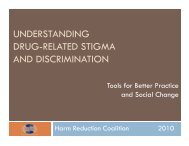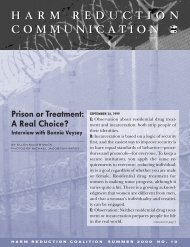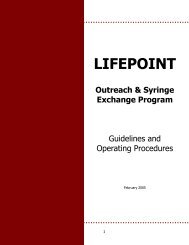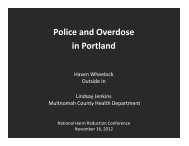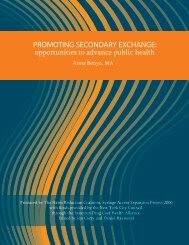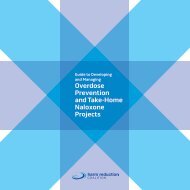9th - Harm Reduction Coalition
9th - Harm Reduction Coalition
9th - Harm Reduction Coalition
Create successful ePaper yourself
Turn your PDF publications into a flip-book with our unique Google optimized e-Paper software.
<strong>9th</strong><br />
National <strong>Harm</strong> <strong>Reduction</strong> Conference<br />
FROM PUBLIC HEALTH TO SOCIAL JUSTICE<br />
Braine, Naomi, City University of New York, Brooklyn, NY<br />
nbraine@brooklyn.cuny.edu<br />
Sexual minority women, drug use, and marginalization<br />
Throughout the HIV epidemic, there has been growing evidence that women who have sex with women (WSW) IDUs experience<br />
greater levels of marginalization than exclusively heterosexual women IDUs. Some studies have found that WSW IDUs<br />
have elevated risks for HIV in comparison to heterosexual women and men, while others have found greater behavioral and<br />
contextual risks but not higher levels of infection. Lack of access to services, including invisibility to and/or prejudice from<br />
staff, may be one factor affecting levels of contextual risk, including homelessness, inadequate medical care, and dependence<br />
on illegal sources of income. This presentation will explore the growing literature on WSW IDUs, and present preliminary<br />
data from a qualitative study of barriers to care for WSW IDUs and NIDUs in NYC. The experiences of this population<br />
illustrate the intersection of multiple forms discrimination and marginalization, as well as strategies used by drug users to<br />
manage their lives and reduce the destruction caused by systematic marginalization.<br />
Naomi Braine is an Associate Professor of Sociology at Brooklyn College, City University of New York and a lifelong queer social<br />
justice activist. She has published in Social Networks, AIDS Education and Prevention, Culture Health and Sexuality, and other<br />
public health and social science journals. Her primary research interests include HIV and drug use, the social Construction of<br />
gender and sexuality, and social policy. She came to research on drug use and HIV through her work as a harm reduction activist.<br />
Breyer, Johanna, Exotic Dancers Alliance (EDA), San Francisco, CA<br />
jbreyer@nyhre.org<br />
UPRISE Peer Training Program<br />
New York <strong>Harm</strong> <strong>Reduction</strong> Educator’s UPRISE (Uniting Peers for the Rights of Injectors and Sex workers Everywhere) Peer<br />
Training program includes a rigorous 14-week workshop training program and a supervised 6-month Field Practicum during<br />
which UPRISE Peers further develop the expertise they need to be effective community educators and advocates. UP-<br />
RISE workshops focus on harm reduction, health education, sexual health, violence prevention, legal rights, and political advocacy.<br />
UPRISE is both a return to NYHRE’s activist roots and a next step in addressing community need through the efforts<br />
of community members themselves. Our Peers are individuals who belong(ed) to social networks of substance users and/or<br />
sex workers whose members regularly interact with each other because of their reciprocal needs to obtain and use drugs<br />
and/or exchange sex for money. NYHRE Peers are able to easily engage these individuals, provide them with information and<br />
help them to live healthier and more stable lives. Our model challenges the traditional relationship between an “all-knowing”<br />
provider and a “helpless” client because we work with participants in a way that respects and honors their autonomy<br />
and individuality while also creating a very real foundation for self-empowerment and self-efficacy. This empowerment then<br />
extends into the community as participants find their voices and begin to share their experiences and knowledge with others<br />
in order to combat stigma and discrimination. Upon completion of UPRISE, NYHRE participants become exceptionally active<br />
in empowering their communities to respond to inequities in public arenas such as public benefits administration, homelessness<br />
and affordable housing provision, methadone maintenance treatment, and discriminatory law enforcement and the<br />
criminal justice process. Additionally, NYHRE Peers provide program support in the areas of prevention outreach, syringe<br />
exchange, and health education for NYHRE participants. The proposed workshop will focus on the challenges and benefits<br />
of developing a peer training program for individuals who use drugs and/or engage in sex work, and explore the correlation<br />
between peer based interventions and increased levels of empowerment, self-advocacy and social capital.<br />
Johanna Breyer is the Co-Founder of the Exotic Dancers Alliance (EDA), and Co-Founder and Former Executive Director of the<br />
St. James Infirmary (SJI). Johanna received her BA in Sociology and Counseling from San Francisco State University in 1993, and<br />
MSW from the University of California at Berkeley in 1998. Johanna worked with several different CBOs in the San Francisco Bay<br />
Area for over 17 years, and is a recipient of the Harvey Milk LGBT Democratic Club Community Service Award.<br />
12



